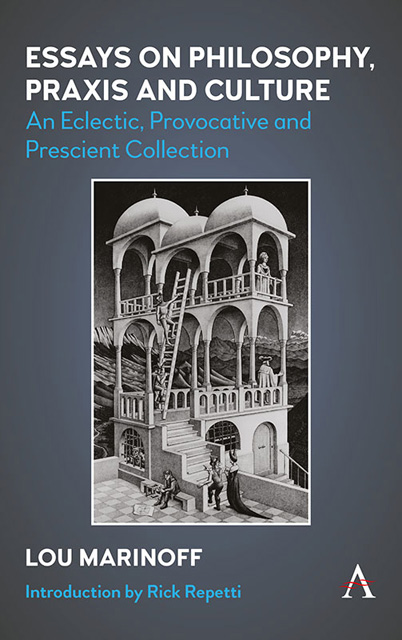Essay #13 - Atlas Shrugged, Akston Counseled: How Ayn Rand Reinvented Philosophical Practice
Published online by Cambridge University Press: 10 January 2023
Summary
This essay was originally read at the Third International Conference for Philosophical Practice, held at the Graduate Center of the City University of New York in July 1997.
It was first published as Lou Marinoff, “Atlas Shrugged, Akston Counseled: How Ayn Rand Reinvented Philosophical Practice,” Journal of Humanities Therapy 7, no. 1 (2016): 1–24.
It is republished here by permission of the Journal of Humanities Therapy.
The embodied extract from Ayn Rand’s Atlas Shrugged is republished here by permission of the Ayn Rand Institute.
Introduction
Ayn Rand is an original, independent, and controversial force in American intellectual life. She was born and educated in Russia but emigrated to this country, convinced that it was the only place in which she could earn complete liberty to write as she saw fit. And she was, by precocious avocation, a writer: this she had decided for herself at age nine. Rand’s American saga is almost unremarkable in its remarkability: she arrived here penniless and friendless, subsisted through a succession of odd and often menial jobs until by dint of her prodigious talent and unflinching integrity, she attained a stature sufficient for the production of her mature and lasting works. Thus, her biography reads like a run-of-the-mill American success story told millions of times over, save that the immigrant norm for the socio-economic transition from utter impecuniosity to material comfort is probably closer to three generations than one. Nonetheless, persons of unusual vitality and ability are supposedly able to run the race in faster time; Ayn Rand, for one, certainly filled the unforgiving minute to the brim.
In my view, Rand is original because she founded a hitherto uncognized school of philosophical thought and deed, primarily a doctrine for romantic capitalists, called Objectivism. Her originality is also evident in that she espoused her philosophy primarily through literary fiction, the medium which most conspicuously displays her gifts. She is independent because, although her philosophy was taken up and practiced by an intelligentsia partly grounded in the academy, she herself held no academic post. Her independence is fiercely personal, but it is neither antisocial nor aloof: it is based on her ability to produce and market her philosophy as an industry.
- Type
- Chapter
- Information
- Essays on Philosophy, Praxis and CultureAn Eclectic, Provocative and Prescient Collection, pp. 243 - 260Publisher: Anthem PressPrint publication year: 2022



